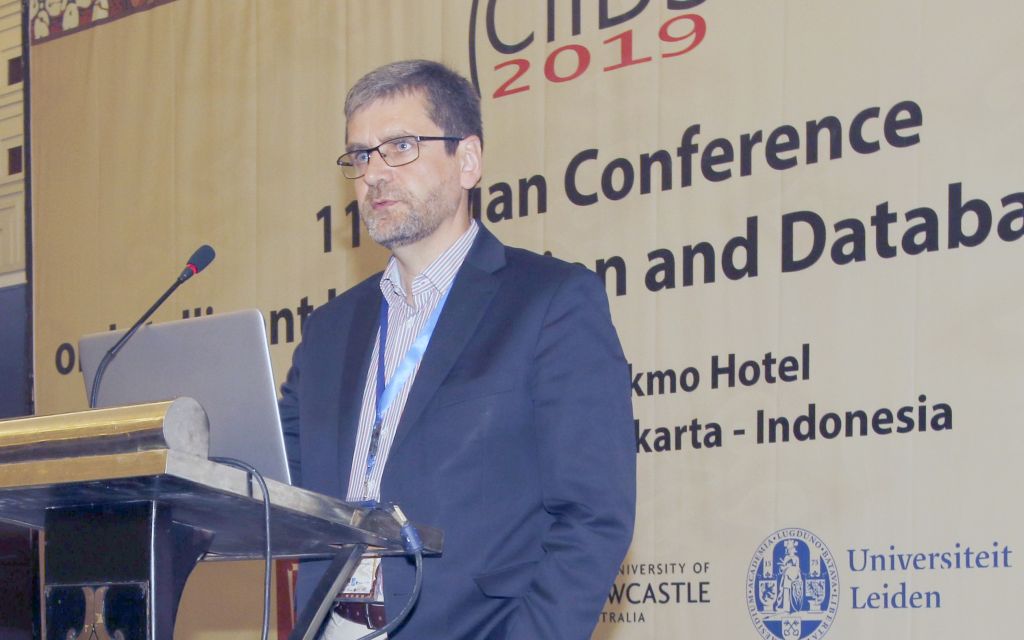YOUR BROWSER IS OUT-OF-DATE.
We have detected that you are using an outdated browser. Our service may not work properly for you. We recommend upgrading or switching to another browser.
Date: 14.01.2021 Category: general news, international cooperation, science/research/innovation
Almost 600 thousand PLN of funding from the National Centre for Science will be granted to researchers from the Faculty of Electronics for their research into lifelong machine learning. They will collaborate on the project with researchers from the Czech Republic.
 The grant was awarded under the CEUS-UNISONO competition for bilateral or trilateral research projects undertaken by teams from Austria, the Czech Republic, Slovenia, and Poland. Projects involving research in all scientific disciplines were admitted to the competition.
The grant was awarded under the CEUS-UNISONO competition for bilateral or trilateral research projects undertaken by teams from Austria, the Czech Republic, Slovenia, and Poland. Projects involving research in all scientific disciplines were admitted to the competition.
In January, nine applications were recommended for funding, among which there was a project entitled “Long-term machine learning based on streaming data”, intended to be conducted at Wrocław University of Science and Technology.
– The project focuses on the issue of lifelong machine learning, i.e. a task where a computer system acquires the ability to learn how to solve new tasks while retaining the ability to cope with previously learned problems – explains Prof. Michał Woźniak, project coordinator at WUST. – To compare it to a human’s learning, you want, for example, to learn how to ride a bicycle without forgetting how to ski, and in the future to acquire new skills without forgetting those previously learned. Traditional machine learning methods mainly focus on solving a single task, or they try to use previously acquired knowledge of a problem to solve a new task (so-called transfer learning) – he adds.
 Research into the issue of lifelong learning is still in its early stages and, unfortunately, many questions related to this field remain unanswered. Some of the most important issues to be solved include those concerning the use of previously acquired knowledge, the retention of knowledge from previous tasks, the transfer of knowledge to future tasks, the updating of knowledge, and ways to incorporate user knowledge into the learning process.
Research into the issue of lifelong learning is still in its early stages and, unfortunately, many questions related to this field remain unanswered. Some of the most important issues to be solved include those concerning the use of previously acquired knowledge, the retention of knowledge from previous tasks, the transfer of knowledge to future tasks, the updating of knowledge, and ways to incorporate user knowledge into the learning process.
– Also, the concept of task used in many formal definitions of lifelong machine learning models is difficult to define. It’s often difficult to draw a line between successive tasks – admits Prof. Michał Woźniak. – One of the main challenges is the so-called stability-plasticity dilemma, in which learning systems must compromise between mastering new tasks and remembering old solutions, applying to artificial intelligence systems and biological systems to varying degrees. This is particularly evident in the phenomenon of catastrophic forgetting, connected with forgetting previously learned concepts when presented with data from a new task – he points out.
 In the course of the project, our researchers will try to use sources including the results of work related to the problem of predictive models’ learning based on streaming data, during which the phenomenon of changing model parameters (concept drift) can be observed, and thus also the need to develop effective mechanisms supporting the adaptation of predictive models to new task conditions.
In the course of the project, our researchers will try to use sources including the results of work related to the problem of predictive models’ learning based on streaming data, during which the phenomenon of changing model parameters (concept drift) can be observed, and thus also the need to develop effective mechanisms supporting the adaptation of predictive models to new task conditions.
The people involved in the project are staff from the Machine Learning Group of the Department of Computer Systems and Networks, Faculty of Electronics, and researchers from the Faculty of Electrical Engineering and Computer Science (FEI), VSB-Technical University of Ostrava (Czech Republic). The teams have been working together for several years, which led to the signing of a cooperation agreement between our universities in 2012, among other things. During this period, several scientific events have been jointly organised and exchanges of scientific staff have taken place.
The funds obtained under the grant will be used primarily to support research conducted by young employees of the Department of Computer Systems and Networks (a PhD student and two assistant lecturers) by financing their visits at the research partner’s and participation in scientific conferences, as well as to upgrade the unit's computing infrastructure.
– We hope that the project will strengthen the cooperation between our university and the centre in Ostrava and let us jointly obtain further funding for research under European funds – stresses Prof. Michał Woźniak.
Our site uses cookies. By continuing to browse the site you agree to our use of cookies in accordance with current browser settings. You can change at any time.